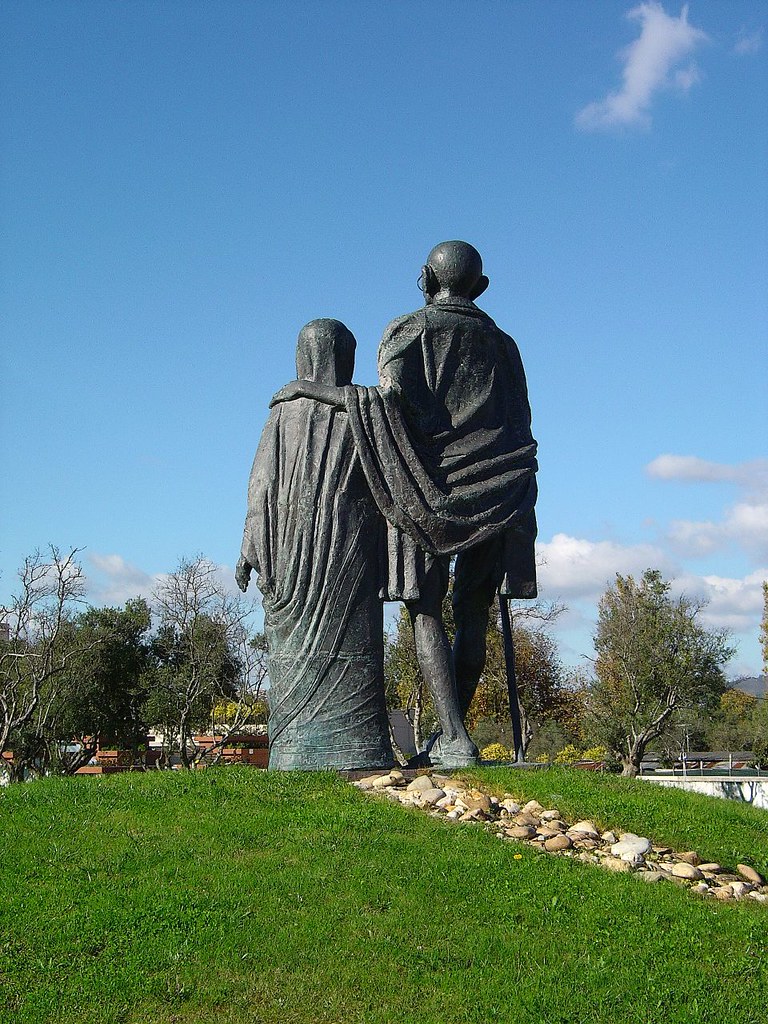
Ramachandra Guha sheds light on the growing rejection of Mahatma Gandhi in modern India: once revered as the “Father of the Nation,” Gandhi is now portrayed as a traitor by the Hindu nationalist right. Guha shows how the Modi government deliberately ignores Gandhi’s philosophy of nonviolence and religious tolerance, instead engaging in a revision of history that questions Gandhi’s legacy.
Guha, born ten years after Gandhi’s assassination, grew up in a family that deeply revered Gandhi and initially recounts his own experience in an environment where Gandhi was regarded as the “Father of the Nation.” Gandhi’s philosophy of nonviolence and religious pluralism was then a central element of Indian self-identity and was seen by many as a cornerstone of national identity and independence.
Guha describes how Gandhi was a towering figure for his generation and for Indian society as a whole. His efforts to free India through nonviolent resistance against British colonial rule, and his tireless commitment to religious harmony, were regarded as indispensable components of the young Indian nation. Gandhi was venerated not only for his political legacy but also for his moral convictions and his dedication to the unity and diversity of India.
However, Guha explains that critical voices against Gandhi already emerged in the 1980s. Especially Marxist intellectuals, whom Guha encountered during his academic career, began sharply criticizing Gandhi. They viewed him as an ally of the British colonial power and the Indian capitalist class, arguing that his philosophy of nonviolence was a clever tool to keep the Indian masses from revolutionary ideas and violent resistance. For them, Gandhi was not the liberator but an obstacle to a more radical, revolutionary transformation of society.
Despite this criticism, Guha remained convinced that Gandhi’s commitment to nonviolence and religious tolerance arose from profound conviction and deep ethical obligation. He argued that Gandhi’s rejection of violence was based on a fundamental aversion to killing, and that his efforts to preserve India’s religious diversity were key to peaceful coexistence in the young nation.
Today, Guha continues, the nature of attacks on Gandhi has fundamentally changed. In the 2020s, the sharpest assaults on his legacy come from the Hindu right, which has been in power in India since 2014 under the leadership of the Bharatiya Janata Party (BJP). This movement, closely linked with the Rashtriya Swayamsevak Sangh (RSS), decisively rejects Gandhi’s ideas of nonviolence and religious pluralism. The RSS, which aspires to a Hindu theocracy in India, never accepted Gandhi because he tirelessly defended the Muslim minority and promoted religious harmony. These efforts, Guha explains, ultimately led to his assassination by Nathuram Godse, a member of the RSS.
According to Guha, the current government under Narendra Modi, who himself comes from the RSS, has set out to rewrite Indian history. It attempts to portray the role of Muslim rulers in India negatively and brand Gandhi as a weakling and traitor who harmed the Hindu majority. Modi, Guha points out, expresses ambivalence about Gandhi: on the one hand, he praises him internationally to boost his own image; on the other hand, he deliberately ignores Gandhi’s core ideals, especially his vision of a nation belonging equally to all religions.
Guha paints a picture of how Gandhi, once regarded as the savior and founder of modern India, is now increasingly seen as an obstacle and traitor. This development represents not only a revision of history but a fundamental rejection of Gandhi and his ideals in today’s Indian society. The Congress Party, which long portrayed itself as Gandhi’s heir, also contributes to this trend by betraying his ideals in practice and becoming entangled in corruption and abuse of power.
In conclusion, Guha issues a stern warning that India urgently needs Gandhi’s ideas to face its current social, ecological, and political challenges. Despite the growing hostility toward Gandhi in India, his ideals may continue to find recognition and significance globally—much like the teachings of Buddha, which were once neglected in his homeland but found worldwide resonance. Guha sees this global recognition as a consolation but also as a tragic irony that India, the country Gandhi once led, is increasingly rejecting his message and legacy.
Aditional links:
- India against Gandhi — a legacy rewritten (ft.com)
- Der stille Coup zum Soundtrack Gandhis – Die Agenda der BJP – theinder.net %
Picture: (c) Vitor Oliveira, CC BY-SA 2.0







Ich halte das für eine absolute Respektlosigkeit demjenigen gegenüber, der maßgeblich die Freiheit von der britischen Herrschaft herbeigeführt hat! Aber es ist interessant, daß die Kommunisten die ersten waren, die Gandhi öffentlich kritisiert haben sollen. Daß die RSS der Drahtzieher für die Ermordung war u.a. aufgrund des sekulären Gedankens Gandhis, scheint mir eine plausible Erklärung.